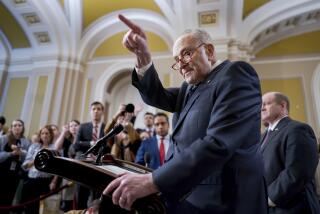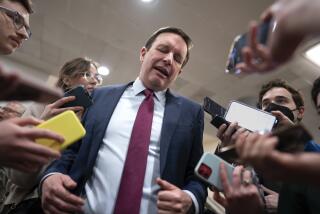Senate debt vote delayed in quest for elusive compromise
Lawmakers huddled in tense negotiations as a weekend of round-the-clock sessions became a test not only of whether a solution could be found for the stalemate over the federal debt, but also of whether a viable center still exists in American politics.
Late Saturday night, Senate Majority Leader Harry Reid postponed a scheduled 1 a.m. Sunday test vote on a compromise bill. Reid said he wanted to give the parties more time to negotiate. Talks were underway at the White House, he said, and he was now “optimistic” the key Democratic demand — a long-term debt limit increase that would carry the government through 2012 — would be agreed to.
“I’m glad to see this move toward cooperation and compromise,” Reid (D-Nev.) said. “I hope it bears fruit.”
If Reid’s optimism is borne out Sunday, it would be a last-minute reprieve from an increasingly grim scenario. Again and again in recent weeks, the pragmatism that so often has resolved difficult problems in government has collapsed under the weight of ideology. Negotiations repeatedly have broken down at the point of real concession. Republican leaders in the House of Representatives faced a right-flank revolt when they pushed a bill sold as a compromise.
All day Saturday, Senate leaders tried to cobble together a coalition in a divided Congress. The aim was to reach the kind of agreement most economists, investors and foreign governments all along have believed would emerge before the world’s biggest economy was subjected to an unprecedented risk.
The potential deal that was in the works late Saturday would include an agreement to raise the debt ceiling by at least the $2.4 trillion that President Obama had requested without requiring a second round of congressional approval Republicans had sought, according to a Democratic official familiar with the talks who spoke on condition of anonymity to discuss the negotiations.
The deal would cut long-term federal spending in two phases. A first phase would cut about $1.2 trillion over the next decade from federal agency budgets. A second would create a bipartisan panel to propose a further $1.6 trillion in deficit-reduction measures later this year.
If that committee deadlocked, or if its recommendations were not approved, further automatic cuts would be triggered on long-term spending for both domestic and defense programs. An automatic cut in Medicare spending might also be imposed, the official said. Democrats appear to have given up a quest for a trigger that would impose revenue increases, deferring the tax debate until after the 2012 election. Republicans appear to have given up the idea of tying the debt increase to a vote on a balanced budget amendment to the Constitution.
Vice President Joe Biden was the main go-between in talks involving the White House and congressional leaders, including Senate Republican leader Mitch McConnell of Kentucky.
Another Democratic official expressed the increased optimism at the White House. “Clearly everyone agrees we need to find consensus,” the official said. “While we’re not there yet, we’re closer than we were 24 hours ago.”
The optimism over progress in the talks remained fragile, however, and came only after a stalemate that has left many in and outside of Congress frustrated.
“We’ve all talked about the need to see compromise here, and then we go on to say why we can’t compromise,” Sen. Lisa Murkowski (R-Alaska) said in a floor speech Saturday. “The one thing we have managed to do on a bipartisan basis here in this Congress is to incite fear in the American public.”
“Somewhere there’s a silver bullet,” said Sen. Johnny Isakson (R-Ga.), another potential deal maker. “The Lone Ranger had it.... Why can’t the U.S. Congress find it?”
Those sorts of lawmakers long have served as a bridge between the parties, making them the key to forging agreements on highly contentious issues.
But in today’s Congress, such centrists have become scarce.
“Folks are suspicious now,” said Sen. Saxby Chambliss (R-Ga.), a member of the bipartisan Gang of Six senators who recently offered a large-scale deficit-reduction plan and is also a close friend of House Speaker John A. Boehner (R-Ohio).
Earlier in the day, some signs of an emerging center had come forward. After months of currying favor with the most conservative members in the House, Boehner met with the “Tuesday Group,” a band of GOP moderates.
McConnell spoke by phone with Obama as well as Biden. Reid and House Minority Leader Nancy Pelosi (D-San Francisco) met with the president. And Reid told reporters he was in touch with GOP senators, saying cryptically: “There are things going on.”
The apparent progress in negotiations was a far cry from the public action. The House earlier Saturday voted down a bill identical to the one Reid had introduced, but not voted on, in the Senate. The move was an answer to the Senate’s defeat Friday night of the House’s proposal.
The action came even though “both bills are very similar,” Sen. Scott Brown (R-Mass.) said.
The theatrics have many questioning Washington’s ability to function at a crucial moment. Polls show voter discontent with both parties has risen to unusual heights. At the same time, both parties are casting anxious eyes at the next election, making it harder for either to change the partisan habits many voters say they despise.
Democrats are trying to protect both Obama and their threatened Senate majority. Restless liberals are frustrated by what they see as Obama’s repeated capitulation to Republicans.
Republicans are still reeling from the grass-roots uprising of the “tea party” movement that helped send dozens of hard-line conservatives to Congress in November’s election. Onetime deal makers of the Senate — Richard G. Lugar (R-Ind.) and Orrin G. Hatch (R-Utah), for example — have shifted to the right, fearing primary challenges.
When McConnell floated a compromise this month, freshmen in the House dubbed it the “Pontius Pilate” plan.
One veteran Republican lawmaker, talking about the debate with reporters, stopped himself when he let one word escape: “I’m not supposed to say ‘deal,’” he said.
Political dynamics aside, former lawmakers say something fundamental has changed. The days of bipartisan socializing and interaction are gone. Many members make a point of spending as little time in Washington as possible, sleeping in their offices and leaving most weekends.
The result is a shortage of the personal relationships and political understandings that ease compromise. Former Rep. Robert Borski, a centrist Democrat from Pennsylvania who left office in 2003 after 20 years in the House, said that by the end of his tenure partisanship had increased to the point where Republicans would “avert their eyes” when he passed them in the Capitol corridors.
Votes to raise the debt ceiling “were routine,” Borski added. “The opposition would make it uncomfortable for you, but … nothing like this.”
kathleen.hennessey@latimes.com
Staff writers Peter Nicholas and James Oliphant contributed to this report.
More to Read
Start your day right
Sign up for Essential California for news, features and recommendations from the L.A. Times and beyond in your inbox six days a week.
You may occasionally receive promotional content from the Los Angeles Times.








